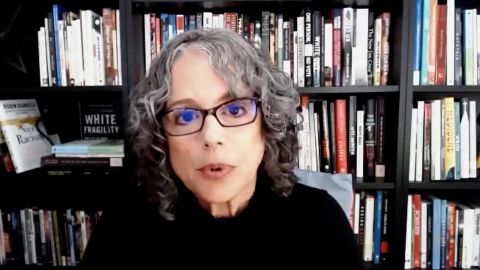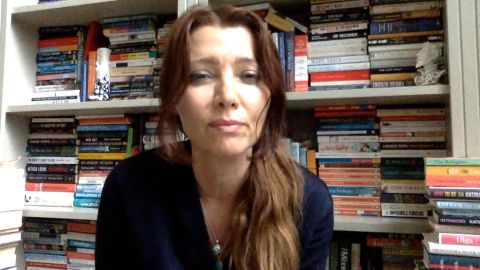Read Transcript EXPAND
CHRISTIANE AMANPOUR: But I want to ask you to tell me about the trees and the nature and the natural world through which you tell this story. What made you focus on that?
ELIF SHAFAK, AUTHOR, “THE ISLAND OF MISSING TREES”: I think there are two layers. I have been wanting to write about Cyprus for a long time now. But I couldn’t there because it’s a difficult story. It’s a very emotional story. And the wounds are not healed yet. So, I didn’t know how to approach the story until I found the fig tree, the voice of the fig tree. And what brought me closer to the tree was like many people throughout the pandemic and the lockdown, I also began to rethink about my own connection with nature, with trees, with Earth, you know, those seemingly small moments just sitting under a tree, reading a book, I felt the need to reconnect. And that gave me the idea, you know, into the story of the fig tree.
AMANPOUR: So I’m going to get back to the trees in a moment, but you’ve brought up Cyprus and where your story is set. So tell us, tell the viewers about Cyprus, because it’s clearly still, I think, it’s the only divided capital in Europe, Nicosia, the capital of Cyprus, between Greek and Turkish Cypriots. Civil War of the 70s still has not been resolved. So just set the scene for us about Cyprus and your main characters.
SHAFAK: Indeed. This is a divided islands and there are so many hurts and pains accumulated due to the division and the very complex history clashing nationalisms. I think the story I’m hoping might also resonate with anyone who comes from troubled past and divided lands. Basically, this is a novel about intergenerational memory and trauma. I think I do believe in inherited pain. I know it doesn’t sound very scientific, but I do believe that the stories and silences that run in our families somehow shape us. And I have met many immigrant families or families in exile or families coming from difficult pasts in which the first generation bears the memories. The second generation is busy adopting finding their feet belonging, but it’s the third or the fourth generations, the youngest in the families that are digging into the memories of their ancestors. They want to know more about their identity. So the story partly takes place in London with Ada who is the child of a Greek Cypriot and the Turkish Cypriot. And there are so many things that she never heard about. At the same time, I think this is a book about renewable nature, ecological thinking and eco-consciousness.
About This Episode EXPAND
California Governor Gavin Newsom discusses COVID, wilfires and his recall election. Elif Shafak discusses her new book “The Island of Missing Trees.” CNN correspondent Fred Pleitgen gives an update from Iran. Anti-racist educator Robin DiAngelo discusses her new book “Nice Racism.”
LEARN MORE



